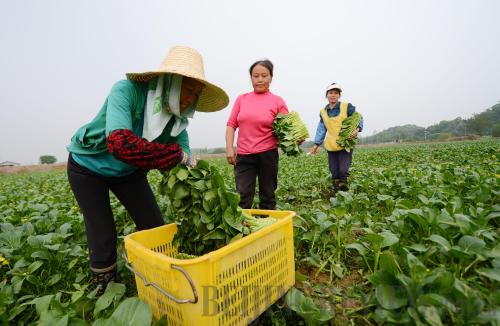|
 |
|
FERTILE INDUSTRY: Farmers harvest vegetables in Yongxiu County, Jiangxi Province. The province is home to 8.3 million mu (553 hectares) of vegetables, with an annual production of 12.25 million tons (ZHOU KE) |
Financing SMEs
China will provide better support for small and medium-sized enterprises (SMEs) by simplifying how funds are allocated, the Ministry of Finance (MOF) said on April 14.
The ministry, along with the ministries of industry and information technology, science and technology, and commerce, issued a notice to improve the efficiency in the way funds are allocated to SMEs.
According to the notice, funds will be allocated to SMEs to help improve technological innovation, financing, services, and international cooperation.
The notice also highlighted more support for SME innovation in information technology, resource saving, new energy development, the biomedical industry and modern agriculture.
A subsidy for each new innovative project will stand at no more than 3 million yuan ($487,560), or 40 percent of the research and development cost at most, according to the notice.
Corporate Defaults
Chinese banks have the means to deal with corporate bond and trust defaults, Deutsche Bank said in a research note on April 15.
A study by the bank found that listed Chinese banks hold 37 percent of outstanding debts in China's corporate bond market and have provided 36 percent of the funding for the country's trust sector.
That puts 88 billion yuan ($14.14 billion) worth of bank assets at risk. But according to Deutsche Bank, they are well covered by the 819 billion yuan ($132 billion) the banks have set aside to cover bad assets.
The bank said its study covers 2,400 corporate bond issuers and 13,000 trust products, with a total credit balance of 237 billion yuan ($38 billion).
The bank said only 22 out of 2,400 bond-issuing firms are highly risky. Sixty-five percent of these firms are from industries saddled with overcapacity, including the steel, mining, metal and solar sectors.
China also witnessed the first onshore corporate default in March when a Shanghai-based solar firm failed to pay 89.8 million yuan ($14.4 million) in interest.
Meanwhile, authorities and banks have shown growing reluctance to bail out troubled assets, which analysts said could help correct distortion in risk pricing but could also stoke fear of more defaults to come.
Deutsche Bank said while May and June could see a peak number of bonds and trust products come due, investors could learn that actual defaults are less than they thought, regaining confidence in Chinese banks.
The report also added that it is normal for defaults to rise steadily as a way to correct distortions in pricing credit risks and improve the efficiency of capital allocation.
Simplifying Approval
The review and approval process for foreign-funded enterprises to operate telecom value-added services in the Shanghai Free Trade Zone (FTZ) has been simplified, the Ministry of Industry and Information Technology (MIIT) announced on April 15.
The review and approval authority has been delegated from the MIIT to the Shanghai Communications Administration, said the MIIT in a document.
The length of time from submission of application to approval has been shortened to no more than 60 days down from five months.
Telecom value-added service providers refer to those using public telecom network infrastructure and providing value-added services including call centers and smartphone app stores rather than traditional voice telephony services.
| 